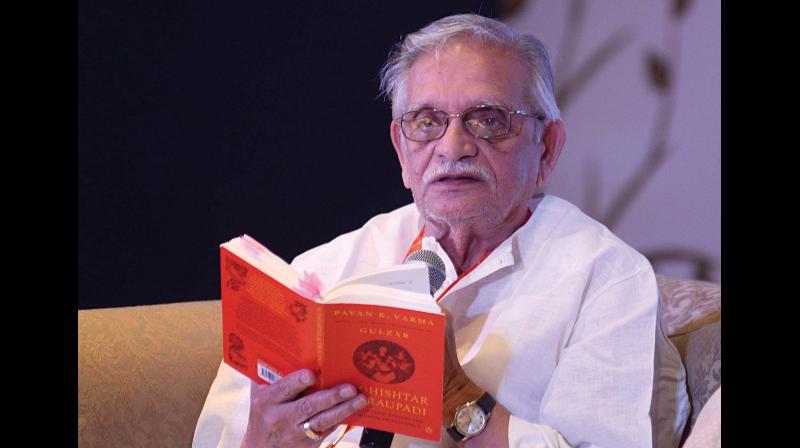Bengaluru Poetry Festival: Gulzar, Varma jugalbandi on translation
This Sunday began with a chat with poet-lyricist Gulzar, who spoke about the intricacies of translation.

Bengaluru: The second edition of the Bengaluru Poetry Festival, easily the most awaited poetry celebration of the year, ended with a flourish at Leela Palace. The star studded two-day festival saw names like poet-lyricist Gulzar, musician Ustad Amjad Ali Khan, poets like Ranjit Hoskote and Jerry Pinto to name a few.
Spread over thirty sessions and ten workshops that included works in vernacular languages as well, poets, musicians, storytellers, publishers and singers took part in this celebration.
This Sunday began with a chat with poet-lyricist Gulzar, who spoke about the intricacies of translation. He was in conversation with poet and former diplomat Pavan Varma.
Unlike Saturday, when Varma was the translator of Gulzar’s Suspected Poems, this time, it was the famed Bollywood personality who was the translator.
The discussion was centered around the English to Hindi translation of Varma’s book ‘Yudhishtar and Draupadi’ by Gulzar. “I had to translate the sonnet to Hindi as I had gone on reading the book. It helped me understand it better. Later on, I was in Delhi and I had asked Pavan to come and meet me for ten minutes. Pavan was taken aback when he heard his own poem as I read it to him in Hindi, but he liked the translation,” he said.
Poet Varma revealed that the biggest challenge is to retain the emotion of the poem as it is translated. “Transliteration is not translation. One not only has to convey the meaning, but also the feel behind the poem. Proficiency of both the languages is required as much as the understanding of both cultures.”
Gulzar added that if he feels a little under confident about a translation, he at once asks for help. “See, if I am translating a Malayalam poem, I sit and work with an expert in the language and make them read it out. Understanding the rhythm of the language is one of the keys so that I can make the right choices with words and sounds,” he said.
Jerry Pinto’s humourous poems were an instant hit amongst the audience. Commenting on a poet’s block, he said, “Iam nothing like my poems. I feel I might be a poet every alternate Tuesday.”
The audience burst into laughter to which he shook his head and said, “I’m serious… sometimes my poems have lines like I want to… and then I don’t know what I’m doing.”
Sessions were conducted by poets Punam Chadha-Joseph, Ranjani Murali, Rochelle D'Silva, Rochelle Potkar, Samantak Bhadra and Medha Singh to name a few. A discussion was also held about publishing poetry.
“The best way to go about it is submit to magazines and get feedback; if it gets rejected, don’t stop writing altogether. Improve. Be concise and pitch yourself better,” panelist and poet Medha
Singh advised budding poets in the audience. As for politicisation of awards, Jamuna Rao, founder of Dronequill Publishers who was a part of the panel along with Sundeep Bhutoria and Singh said, “In spite of this politicisation I still think awards are good for an artist. Say for example, a poet from a remote part of Karnataka gets a national award; his name would show up every time someone looked for national awardees. It gives one recognition, maybe after reading about his award, someone may read their book. As far as publishing is concerned, it makes an author visible.” Rajasthani folk singers Mame Khan and group wooed the audience with tunes from the Thar desert as the second edition of the BPF came to an end.

